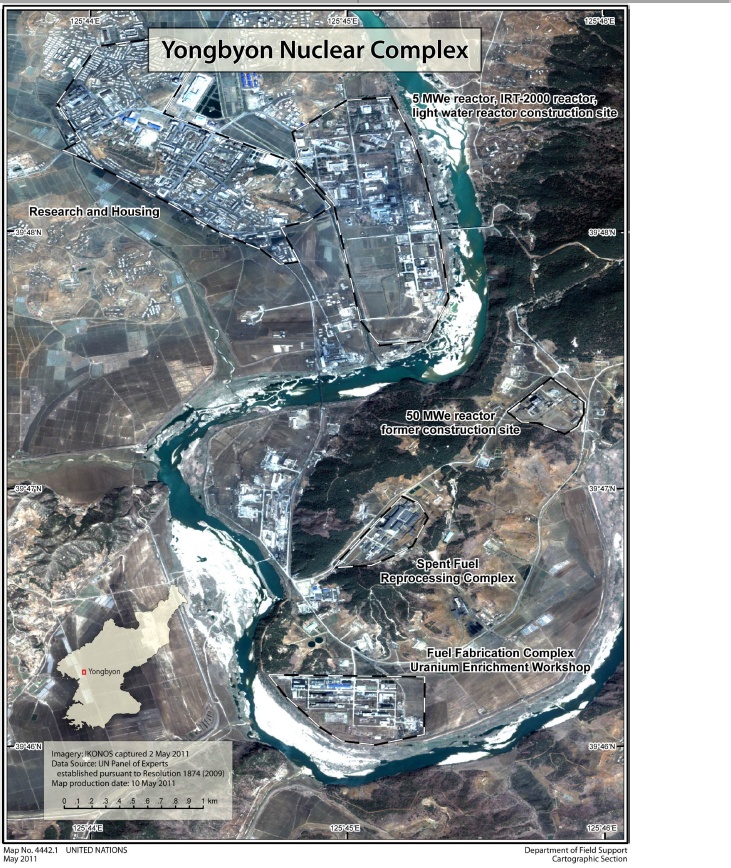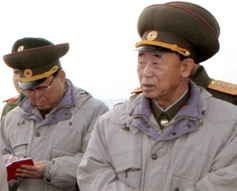NDC Statement Pronounces DPRK “Will Never Deal With” Lee Myung-bak
The National Defense Commission issued a statement announcing that “the DPRK will launch a nationwide offensive to put an end to the moves of the Lee group to escalate confrontation with the DPRK.” The NDC threatened to “take physical action without any notice at any time” against ROK-based “psychological warfare.” It also announced the termination of an inter-Korean military ‘phone line in the East Sea (Sea of Japan), and the closure of an office at Mt. Kumgang. JoongAng Ilbo reports:
In a statement reported by the North’s official Korean Central News Agency, the National Defense Commission, chaired by North Korean leader Kim Jong-il, said it will cut military communication lines along the East Sea coast and shut down a liaison office on Mount Kumgang.
It said these are the first steps and more will follow.
“We will enter a full-scale offensive designed to put to an end the maneuvers by the traitor Lee Myung-bak and its thuggish clan to confront the Republic [Democratic People’s Republic of Korea],” the NDC spokesman said in a statement, referring to the South Korean president.
“The full-scale offensive by our military and the people will be merciless,” the statement said.
The verbal threats come as the two Koreas remain at odds over the two provocations directed at the South last year – the sinking of the warship Cheonan, for which the North denies any involvement, and the shelling of Yeonpyeong Island. Seoul has refused to put the events behind it before an acknowledgement or apology from the North.
Late last month, former U.S. President Jimmy Carter visited South Korea after a trip to Pyongyang with a message from Kim that he was willing to have an inter-Korean summit.
Seoul regards it as a showy gesture lacking sincerity and is calling for the North to respond to its call for inter-Korean talks that it made in January through direct and official diplomatic channels.
The remarks yesterday are also being looked at to determine whether they hint at a downshift in the North’s will to economically engage the South following apparent growing economic ties with China.
Last Friday, Kim Jong-il finished a trip to China, the third in a year, which was observed by some to have taken economic ties between the two communist allies to a closer level.
In the statement, the NDC also reiterated its warning against the psychological warfare tactics of the South, including border-crossing anti-regime leaflets and reconfirmed its threat of sudden strikes from where the leaflets are sent.
Yonhap reports:
North Korea threatened Monday that it will no longer engage with South Korea and will retaliate against Seoul for anti-Pyongyang “psychological warfare.”
“The army and people of the (North) will never deal with traitor Lee Myung-bak and his clan,” the North’s powerful National Defense Commission said in a statement, referring to the South Korean president by name.
The commission headed by North Korean leader Kim Jong-il also renewed a warning that the North “will take physical action without any notice any time against any target to cope with the anti-(North Korea) psychological warfare.”
In April, North Korea threatened to launch “unpredictable and merciless” fire against South Korea over anti-Pyongyang leaflets.
South Korean activists and defectors, however, have continued to send hundreds of thousands of leaflets calling for a popular revolt to topple Kim, which the North sees as psychological warfare against it.
The latest harsh rhetoric came just days after Kim called for the easing of tensions on the Korean Peninsula during his summit talks with Chinese President Hu Jintao in Beijing.
Kim has said his country sincerely hopes for improved relations with South Korea, according to China’s official Xinhua news agency.
Xinhua reported:
According to a statement issued by the DPRK’s National Defence Commission, two more steps would be taken in this regard.
“The DPRK will launch a nationwide offensive to put an end to the moves of the Lee group to escalate the confrontation with the DPRK,” the statement said.
The Korean People’s Army would “cut off the north-south military communication in the area along the east coast” and “close the communication liaison office in Mt. Kumgang area,” the statement announced.
“As already warned by the DPRK, it will take a physical action without any notice any time against any target to cope with the anti-DPRK psychological warfare,” it added.
The statement said Lee’s government is piling up false accusations against the DPRK’s “revolution” and “socialist system,” “undermining its national reconciliation and unity” and “laying a hurdle in the way of peace and prosperity.”
It said South Korea is trying to stop the DPRK’s legitimate measures for self-defense and driving the inter-Korean relations to “uncontrollable catastrophe.”
Lee Myung-bak’s government has been smearing the DPRK’s efforts to achieve cooperation, peace and reunification through dialogue as “delaying tactics,” the statement said.
The inter-Korean relations were further soured in March last year by the sinking of the South Korean corvette Cheonan. South Korea insists the warship was sunk by the DPRK’s torpedo, an accusation the DPRK denies.
The two countries also exchanged fire off Yeonpyeong Island last November, leaving four South Koreans dead and prompting Seoul to begin to build up its forces on five front-line islands in the Yellow Sea.

A satellite image which is appended to the May 2011 Report of the Panel of Experts Established Pursuant to Resolution 1874 (UN Department of Field Services Cartographic Section via Hankyoreh)
The May 2011 report by the UNSC Panel of Experts assesses that the DPRK’s UEP has a military use. Via Hankyoreh (which includes this link to the report):
In the report, the panel said it “believes both that, despite the assertions of the Democratic People’s Republic of Korea to the contrary, its long pursuit of a uranium enrichment programme was primarily for military purposes, and that the risk that the uranium enrichment workshop could easily be converted for military purposes should be underlined.”
“The Panel of Experts strongly believes that the Democratic People’s Republic of Korea should be compelled to abandon its uranium enrichment programme and that all aspects of the programme should then be placed under international monitoring, and suggests steps towards this in its recommendations,” it added.
The report includes satellite pictures of North Korea’s Yongbyon Nuclear Complex Fuel Fabrication Complex and Uranium Enrichment Workshop.
According to Yonhap News, however, the report was not officially adopted by UN Security Council as China refused to do so saying that the North’s nuclear issue should be discussed at the six-party talks.
Meanwhile Chosun Ilbo reports on viewing a fence in Dandong and a 28 May ceremony that did not happen:
A trip down the highway across the Apnok (or Yalu) River in China’s Dandong, Liaoning Province leads to a large field surrounded by double barbed-wire fences. Without the fences it would not stand out, but this is Hwanggumpyong, which has been at the center of recent cracks in Sino-North Korean relations.
The field, part of the breadbasket of North Korea’s Sinuiju region, straddles the North Korea-China border. There have been rumors since last year that Pyongyang had signed a development pact and would lease it to China for 50 years for development of an industrial park.
There has been no official comment from China, but a ground-breaking ceremony for the development scheduled for Saturday has been cancelled, apparently because China had second thoughts. “Since last year, I’ve had business officials from other regions like Tianjin and Qingdao, asking me whether there’s any vacant office spaces for rent,” said a business owner in Dandong.
But people in Dandong have not lost all hope of potential development of the area. One Chinese businessman who has traded with North Korea since the 1990s, said, “Business projects with North Korea usually take a long time to materialize, and talk of developing Hwanggumpyong and Wihwa islands have been around for a long time, so I feel they will happen someday.”
Other major projects are already under way in Dandong. The Chinese city plans to build a new city in the Langtou area to house 200,000 people by 2020. A bank building and high-rise apartments have already sprung up in the area, which was a barren tract of land just three years ago. And a new bridge is being built linking Langtou with the North Korean border town of Ryongchon across the Apnok River.
